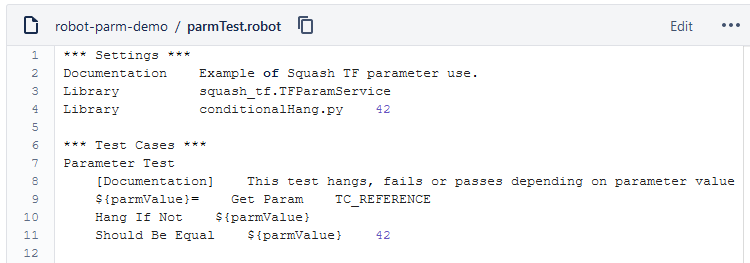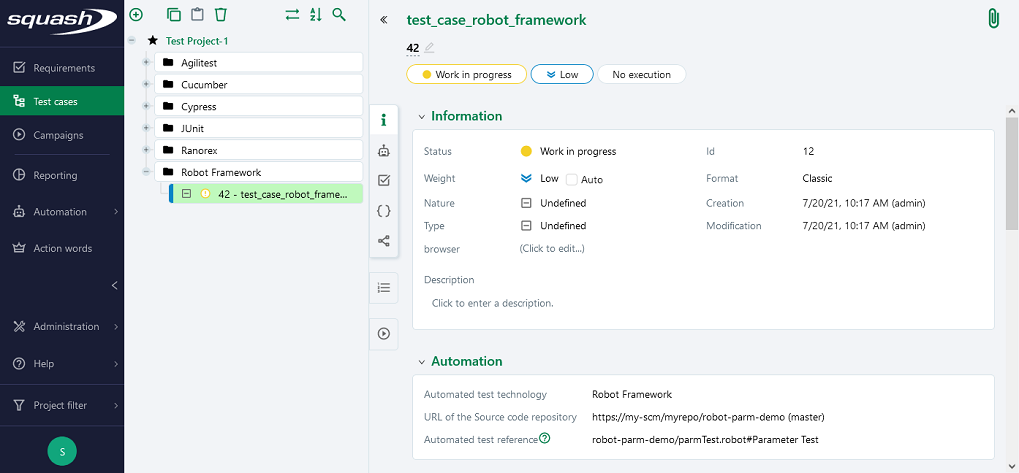Automation with Robot Framework
Configuration of the execution environment
The allure-robotframework Python module must be present in the execution environment.
It can be installed with the command:
pip install allure-robotframework
In order to retrieve the Squash TM parameters, the squash-tf-services Python library must be present.
It can be installed with the command:
pip install squash-tf-services
Test reference in Squash TM
In order to bind a Squash TM test case to a Robot Framework automated test, the content of the Automated test reference field of the Automation block of a test case must have the following format:
[repository]/[file]#[test_case]
or
[repository]/[file]
(The reference contains zero or one # character.)
with:
-
[repository]: Name of the Git repository. -
[file]: Path and name of the Robot Framework test, from the root of the project (with the.robotextension).
It is possible to not indicate a.robotfile name and, instead, only define the name of a folder. In this case, all the.robotfiles of this folder and its sub-folders will be executed. -
[test_case]: Name of the test case to execute in the.robotfile(s).
This parameter is optional, i.e. it may be absent.
Determination of the result of the test case
If a test case [test_case] is not specified, the result of the Squash TM test case is calculated by taking into account the individual results of each test in the file/folder [file]:
- If at least one test has an Error status (in case of a technical issue), the status of the execution will be Blocked.
- If at least one test fails functionally and none of the other ones has an Error status, the status of the execution will be Failed.
- If all tests succeed, the status of the execution will be Success.
Nature of the exploitable Squash TM parameters
The exploitable Squash TM parameters will differ depending on whether you're using the Community/Premium or Ultimate version of Squash.
Here is a table showing the exploitable parameters (these parameters are transmitted as test parameters, see below, Squash TM does not generate global parameters):
| Nature | Key | Community/Premium | Ultimate |
|---|---|---|---|
| Name of the dataset | DSNAME | ✅ | ✅ |
| Dataset parameter | DS_[name] | ✅ | ✅ |
| Test case reference | TC_REFERENCE | ✅ | ✅ |
| Test case internal UUID | TC_UUID | ✅ | ✅ |
| Test case custom field | TC_CUF_[code] | ✅ | ✅ |
| Iteration custom field | IT_CUF_[code] | ❌ | ✅ |
| Campaign custom field | CPG_CUF_[code] | ❌ | ✅ |
| Test suite custom field | TS_CUF_[code] | ❌ | ✅ |
Legend:
[code]: Value of the "Code" of a custom field[name]: Parameter name as filled in Squash TM
As indicated, Squash TM adds a prefix to the code of the transmitted custom field. Make sure to take it into account.
Refer to the Squash TM documentation for more information about custom fields.
Parameters usage
It is possible, when running Robot Framework tests, to exploit parameters within it. A parameter can be a test parameter or a global parameter. Squash TM transmits only test parameters. Test parameters and global parameters can be used in the case of a launch from a CI/CD pipeline with the robotframework/params action.
In order to achieve this, you have to follow these steps:
-
Import the squash-tf-services library in the
Settingssection of the.robotfile:Library squash_tf.TFParamService -
You can then retrieve the value of a parameter by calling one of the following keywords:
-
This keyword retrieves the value of a global parameter.${value}= Get Global Param key ${value}= Get Global Param key default_value
If it exists, its value is assigned to${value}.
Otherwise the default value is assigned to${value}; if no default value was provided,Noneis used.
Example:${parameter}= Get Global Param target_base_url http:localhost:8080/sut/ -
This keyword retrieves the value of a test parameter.${value}= Get Test Param key ${value}= Get Test Param key default_value
If it exists, its value is assigned to${value}.
Otherwise the default value is assigned to${value}; if no default value was provided,Noneis used.
Example:${login}= Get Test Param TC_CUF_login test_user -
This keyword combines both types of parameters.${value}= Get Param key ${value}= Get Param key default_value
If a test parameter exists, its value is assigned to${value}.
Otherwise, if a global parameter exists, its value is assigned to${value}.
Otherwise, the default value is assigned to${value}; if no default value was provided,Noneis used.
Example:${login}= Get Param login test_user
-
Example
Below is an example of a Robot Framework test file and the corresponding Squash TM test case automation:


Adding parameters to the test launch command line
You can pass additional parameters to the robot command using the
ROBOTFRAMEWORK_EXTRA_OPTIONS environment variable. Here
is an example of how to define an environment variable in Squash TM and associate
it with the orchestrator.
Some parameters are already defined in the robot command used to
launch tests:
robot \
$ROBOTFRAMEWORK_EXTRA_OPTIONS \
--nostatusrc --listener "allure_robotframework;." \
--test {testcase_name} "{datasource_path}"
You must avoid passing, via the ROBOTFRAMEWORK_EXTRA_OPTIONS variable, the command line
parameters that conflict with the parameters already used, or the parameters
that impact the generation or alter the path of the reports expected by the orchestrator
(view the report list).
Non-support of the space character on Linux
Squash Orchestrator currently does not support the space character () in the ROBOTFRAMEWORK_EXTRA_OPTIONS environment variable for tests executed in a Linux execution environment.
Supported versions
Squash has been validated with Robot Framework 4.0. Any recent version should work properly.